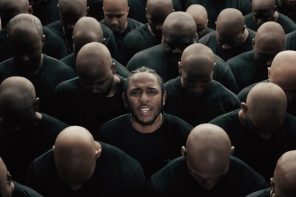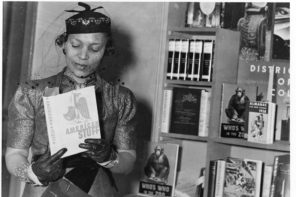In the end of the year spirit of “The Best Of,” I offer my unscientific, admittedly-biased and borderline random ranking of the top ten books in black religion published in 2008 (or those published in 2007 that I didn’t have time to read until 2008!).
Enjoy!
10. Anthea Butler, Women in the Church of God in Christ: Making a Sanctified World, University of North Carolina Press, August 1, 2007
With this groundbreaking book historian Anthea Butler establishes herself among premier scholars of Pentecostalism. This account of the largest Pentecostal denomination and the many ways women carved out a path of social power within the COGIC community via the COGIC’s women’s department has both a critical depth and a lucid flow. This book should surely complement Evelyn Brooks Higginbotham’s classic text Righteous Discontent as indispensable toward understanding the doings and sufferings of black women within the major denominations.
9. Edward Blum, W.E.B. Du Bois, American Prophet, University of Pennsylvania Press, May, 2007
This book disrupts commonly-held assumptions about the religious sensibility, or lack thereof, of one of America’s greatest intellectuals. Blum masterfully reveals the many ways that W.E.B. DuBois appreciated, appropriated and employed religion as both an artistic tool of propaganda and as a source of spiritual sustenance. After using this text in one of my religious studies courses, I know first-hand that this text is engaging and accessible to students at all levels. Without a doubt, this book is a must for any course on the prophet from Great Barrington!
8. John Giggie, After Redemption: Jim Crow and the Transformation of African American Religion in the Delta, 1875-1915, Oxford University Press, November, 2007
Historian John Giggie scours newspapers, black denominational publications and unpublished WPA investigations to reveal the rich religious activity among African Americans in the Delta between Reconstruction and World War I. This account belies the widely accepted characterization of the post-Reconstruction era as the “nadir of black history.” Whether it was popularizing railroad travel as emblematic of black freedom and mobility, the embrace of fraternal orders, or the rise of consumer culture and its relationship to class respectability and gendered domesticity, Giggie illumines the sort of creative religious production in the South that has been most associated with migration and urbanization during the interwar era.
7. J. Kameron Carter, Race: A Theological Account, Oxford University Press, September, 2008
Talk about coming out of the corner swinging! Theologian J. Kameron Carter flexes his theological muscle with this weighty first book. The thrust of his argument is commonsensical yet still compelling by virtue of the author’s sophisticated account. According to Carter the roots of modernity’s racial imagination can be found in Western Christianity’s racialization of the Jews as Semites which led in turn to both a severing of Christianity from its Jewish roots and an outright embrace of white supremacy or “the theological problem of whiteness.” It is this racialized pre-Enlightenment theological discourse that undergirds the racial theories of Immanuel Kant and other modern notions of race.
Now I am certain somebody will have problems with Carter’s McIntyrian conceptions of history that allows him to engage the theological mind of Gregory of Nyssa with figures such as Frederick Douglass and Jarena Lee (I know I do.) To be sure, the chains of radical orthodoxy have in some ways bogged down what is clearly an exceptional mind at work. But the way he is able to position Christian theology as a constitutive force between the racial genealogies of Cornel West and Michael Foucault make this book worth its weight in your briefcase.
6. Eddie Glaude, In a Shade of Blue: Pragmatism and the Politics of Black America, University of Chicago Press, paperback, October 1, 2008
Pound-for-pound, this concise collection of essays represents Eddie Glaude’s multi-faceted approach to black religion and politics at his philosophical best. Glaude brings the pragmatist insights of John Dewey into conversation with African American cultural artists to reveal similar problem-solving approaches demonstrated in the public sphere. In the process, neo-pragmatists have something to learn from the blues sensibility of black cultural artists. More importantly, such a pragmatic approach can help pull contemporary thinkers out of the muck and miry clay of civil rights metadiscourse and tyrannical narratives of nostalgia that have seized black political imagination of the post-soul generation.
To be sure, there will be those who will take issue with Glaude’s seemingly “Westian love-affair” with European scholars and who view Dewey as dispensable to black religious/political thought. This view, however, misses the point. Rather than forcing a connection between, say, James Baldwin and John Dewey, Glaude is simply showing both sides that “We, too, sing America!” African American thinkers are as much of this grand philosophical tradition as Dewey, James or Pierce. The African American community must both learn from it and live it out in regards to political thought and choices.
5. Victor Anderson, Creative Exchange: A Constructive Theology of African American Religious Experience, Fortress Press, April 1, 2008
In many ways this book is both sequel and prequel to Anderson’s contemporary classic Beyond Ontological Blackness. It is a sequel in that Anderson constructs a principled path of moving beyond the flat interpretations of African American religious experience that have been regulated by antiquated notions of “the black church.” Rather, for Anderson, “creative exchange” can be realized in the ambiguous/grotesque moments where beloved community actually takes place.
Yet this book is a prequel as well since the author candidly reveals his own experiences in the black community and local church as a young man wrestling with the intersections of race, class and sexuality in Chicago. These experiences helped to shape the critical approach to notions of identity that came to inform his unmatched critique of the black theology project.
4. Curtis J. Evans, The Burden of Black Religion, Oxford University Press, April 2008
The breadth and scope of this book is vast and impressive. Curtis Evans offers an intellectual history of how ideas about black religiosity from the antebellum to the interwar era have both helped and hindered racial advancement.
Notions of innate religiosity (romantic racialism) were deployed toward the cause of abolition in the antebellum South and then subsequently used to justify their legal subjugation. The same conceptions of a “loving, kind and rhythmically carefree creature” that are seen in books like Uncle Tom’s Cabin soon became representative of the brutal savage that lacks dispassionate rational capacity. This, according to Curtis, serves as a major theoretical noose around the necks of early black scholars of religion like DuBois and Carter G. Woodson as they sought to balance critical cultural appreciation while keeping at bay such essentialist, white supremacist underpinnings. A great text for graduate students.
3. Judith Weisenfeld, Hollywood Be Thy Name: African American Religion in American Film, 1929-1949, University of California Press, June, 2007
History and cultural studies at its best! Judith Weisenfeld’s engagement of race films during the interwar era sheds light upon the way the film industry represented, participated in, and shaped the many discourses taking place around religion, race, gender and class in America. This book is written in a lively and lucid manner, which allows it to be as entertaining as it is informative.
Weisenfeld shows us that cultural artists have long been engaged in cinematic satirical depictions and criticisms of “Old Uncle Ned” and the “Rise and Shine Baptist Church” in ways that make Tyler Perry’s Madea look as original as a church hat on Sunday morning. Moreover, it reveals that romantic racialist conceptions of black religion were just as contested in mass consumer culture as they were within institutions of higher education (see Curtis Evans).
2. William Hart, Black Religion: Malcolm X, Julius Lester and Jan Willis, Palgrave Macmillan, June, 2008
This book shows religious philosopher William Hart at his iconoclastic best. Rather than give lip-service to displacing Afro-Protestantism as the prevailing model of black religion, he uses this book to offer a new theoretical trope of Afro-Eccentricity—that which emphasizes and embraces difference, honors the ancestors by an inchoate sampling of thought yet always musters the courage to call them into question.
This book employs the tools of autobiography and narrative to trace the spiritual lives of three African Americans who ditched Afro-Protestantism for Islam, Judaism and Buddhism. Hart uses these figures to show how complex, sensually erotic and religiously creative spiritual experience can be. But most importantly, he reinforces the overarching point that black religion is wherever and does whatever any African American person may be doing at any given moment.
One warning: this book should have come with a Parental Advisory sticker affixed!
1. Barbara Diane Savage, Your Spirits Walk Beside Us: The Politics of Black Religion, Belknap Press, November, 2008
Many have contested the uncritical use of the term “black church.” And others have even identified the religious, theological and political plurality that causes many contemporary scholars to feel guilty every time we employ this heuristic shorthand. But I have yet to read a book that historicizes, contextualizes and pluralizes the major religious and political debates around Afro-Protestantism in the 20th century as this book does.
Savage offers a genealogy of sorts, from W.E.B. Du Bois to Benjamin Elijah Mays to Nannie Helen Burroughs and Mary McLeod Bethune, to illumine why it is that the more we attempt to engage a progressive political coalition around the black church, the more we realize no such unified institution exists (even more reason to pay attention to Glaude’s recommendations in In A Shade of Blue). If you want to know why many scholars of black religion and church workers squirmed when Rev. Jeremiah Wright gave his impassioned, yet historically flat, defense of the black church before the National Press Club during the height of the Obama campaign, then Read This Book!




